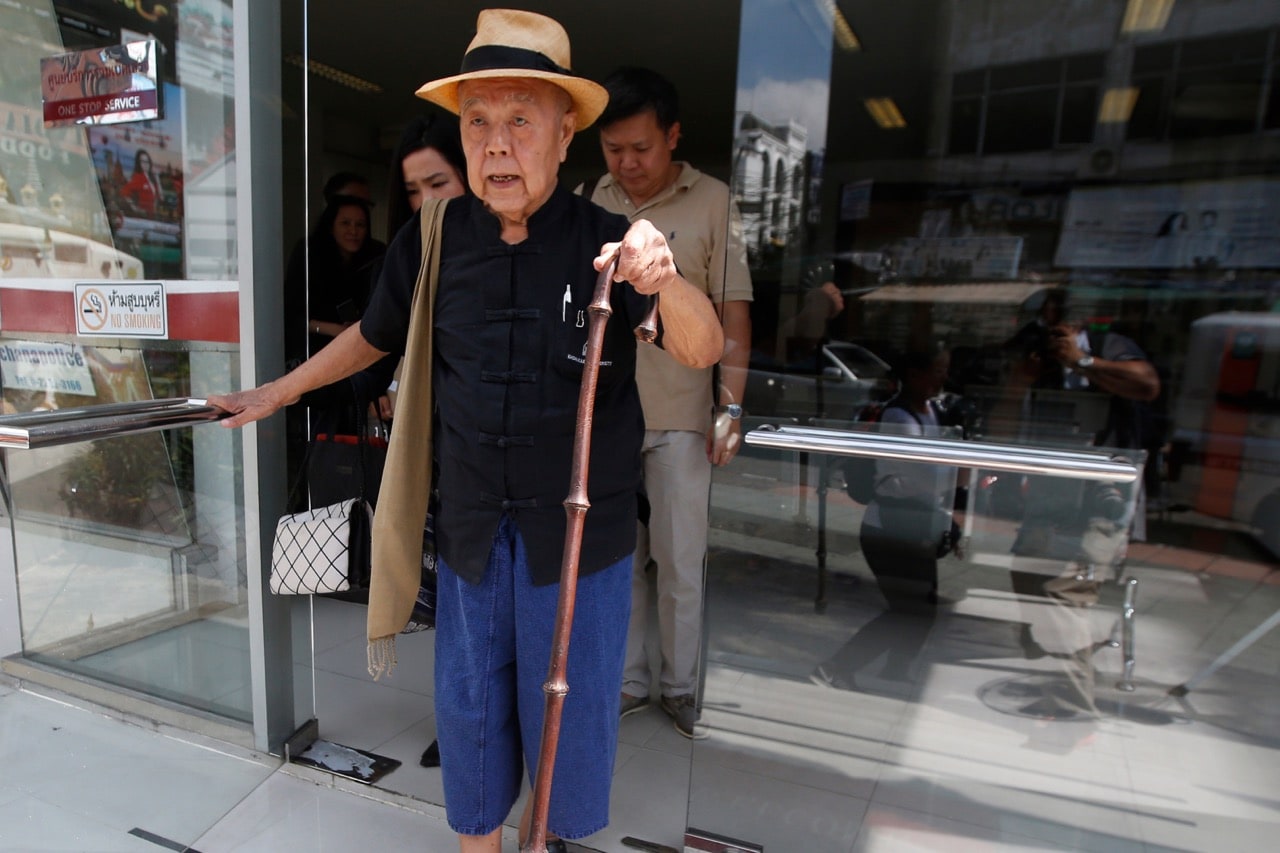PEN International is deeply concerned by reports that renowned writer and activist Sulak Sivaraksa is facing trial for violating article 112 of the Thai Criminal Code (lèse majesté) in a connection with a speech he gave at Thammasat University in 2014.
This statement was originally published on pen-international.org on 27 October 2017.
PEN International is deeply concerned by reports that renowned writer and activist Sulak Sivaraksa is facing trial for violating article 112 of the Thai Criminal Code (lèse majesté) in a connection with a speech he gave at Thammasat University in 2014. PEN International believes that the charges against Sivaraksa are directly linked to his peaceful exercise of his right to freedom of expression and calls for the charges against him to be dropped immediately and unconditionally.
Take action!
Please send appeals:
– Calling for the charges against writer and activist Sulak Sivaraksa to be dropped immediately and unconditionally;
– Urging the authorities to amend the Criminal Code to ensure that it meets Thailand’s international legal obligations to protect freedom of expression, including by decriminalising lèse majesté (article 112 of the Criminal Code) and defamation and insult (articles 326-333 of the Criminal Code);
– Urging the authorities not to subject civilians to military court proceedings.
Appeals to:
Prime Minister
General Prayut Chan-o-cha
Royal Thai Government
Government House
1 Pitsanulok Road,
Dusit, Bangkok 10300,
Thailand
Fax: +66 (0) 2282 5131
E-mail: prforeign@gmail.com
Salutation: Dear Prime Minister
Minister of Justice
Suwaphan Tanyuvardhana
Government Centre Building A
120 Moo 3
Chaeng Wattana Road Soi 7, Lak Si
Bangkok 10210, Thailand
Fax: +66 29530503
Salutation: Dear Minister
Copies to:
Minister of Foreign Affairs
Mr. Don Pramudwinai
Minister of Foreign Affairs of the Kingdom of Thailand,
Ministry of Foreign Affairs,
443 Sriayudhya Road,
Thung Phaya Thai Sub-district,
Ratchathewi,
Bangkok, 10400
Fax: 0-2643-5320; 0-2643-5314
Email: minister@mfa.go.th
Salutation: Dear Minister
Please also send copies of your appeals to the Thai Embassy in your country. Contact details for embassies can be found here.
****Please contact this office if sending appeals after 7 December 2017.****
Background
Sulak Sivaraksa, aged 85, is a well-known social critic and the author of at least 100 books and monographs published in Thai and English addressing Thai society and culture, including Conflict, Culture, Change: Engaged Buddhism in a Globalising World; Seeds of Peace: Buddhist Vision for Renewing Society; Loyalty Demands Dissent: Autobiography of an Engaged Buddhist, among other titles. A proponent of ‘engaged Buddhism,’ which ‘integrates the practice of Buddhism with social action for a healthy, just, and peaceful world,’ according to the International Network of Engaged Buddhists – an organisation which he co-founded in 1989 – Sivaraksa has founded many civil society organisations and cultural initiatives. Sivaraksa has reportedly twice been nominated for the Nobel Peace Prize (1993 and 1994), and is the recipient of the 1995 Right Livelihood Award, as well as the 2011 Niwano Peace Prize, awarded to those who promote peace through interreligious cooperation. He has twice fled the country to live in self-imposed exile (first in 1976-1977 and later in 1991-1992). According to media reports, Sivaraksa sees dissent as an essential part of his loyalty to his nation.
On 9 October 2017, Sivaraksa was reportedly taken before a military tribunal and informed that an almost three-year investigation into allegations of lèse majesté had been concluded. He was reportedly released the same day and told that military prosecutors would decide on whether to proceed with the case at a hearing on 7 December 2017. Should the case against him proceed, Sivaraksa could face up to 15 years in prison.
The charges reportedly relate to a speech that Sivaraksa delivered in October 2014 at an academic discussion held at Thammasat University in which he questioned whether a 16th Century elephant battle between the Thai King Naresuan and the Burmese Crown Prince Mingyi Swa had actually occurred. At the time of his speech, King Naresuan was the subject of an epic film being promoted by the military junta. Sivaraksa reportedly urged the audience “not to easily believe in things. Otherwise they will fall prey to propaganda.” The charges against Sivaraksa were initially filed on 16 October 2014 by two lieutenant generals. King Naresuan is regarded as a national hero by the Thai military; indeed, the National Armed Forces day marks the date of the battle.
Sivaraksa has faced charges of lèse majesté on several occasions previously in relation to his speeches and writings. In each case, he was either acquitted or the charges were dropped, according to Thai Political Prisoners. The current charges against Sivaraksa are particularly unreasonable as they do not relate to the ruling monarch, but that of a monarch who reigned from 1590-1605.
Thailand’s lèse majesté laws which are among the strictest insult laws in the world have remained unchanged since 1908. Article 112 of Thailand’s Criminal Code states that “whoever defames, insults or threatens the King, the Queen, the Heir to the throne or the Regent shall be punished with imprisonment of three to 15 years.”
PEN International urges the authorities to amend the Criminal Code, in particular the lèse-majesté law and the articles that criminalise defamation and insult, to ensure that it meets Thailand’s international obligations to protect freedom of expression. UN human rights mechanisms have repeatedly clarified that criminal defamation and insult laws, including lèse-majesté laws, are incompatible with international standards on free expression. In 2011, the then UN Special Rapporteur on the promotion and protection of the right to freedom of opinion and expression Frank La Rue called on Thailand to reform its lèse-majesté laws. He said, “The threat of a long prison sentence and vagueness of what kinds of expression constitute defamation, insult, or threat to the monarchy, encourage self-censorship and stifle important debates on matters of public interest, thus putting in jeopardy the right to freedom of opinion and expression.” They are also not in line with Articles 9 and 19 of the International Covenant on Civil and Political Rights (ICCPR), to which Thailand is a state party.



